
German postcard by Rotophot in the Film Sterne Series, no. 510/3. Photo: Messter Film, Berlin. Henny Porten and Eduard von Winterstein in the German two-part silent film drama Die Faust des Riesen (Rudolf Biebrach, 1917).

German postcard by Photochemie, Berlin, no. K. 1904. Photo: Alex Binder, Berlin.

German collectors card by Ross Verlag for the album Vom Werden deutscher Filmkunst. Teil I. Der stumme Film (Cigaretten-Bilderdienst Altona-Bahrenfeld 1935), Bild no. 43, Gruppe 41. Photo: Treumann-Larsen-Film. Eduard von Winterstein, Rosa Porten and Reinhold Schünzel in Die Erzkokette/The Superflirt (Franz Eckstein, Rosa Porten, 1917).
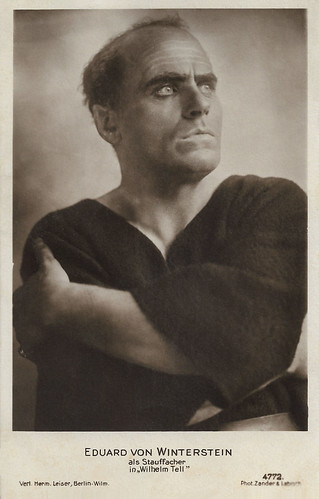
German postcard by Verlag Hermann Leiser, Berlin-Wilm., no. 4772. Photo: Zander & Labisch. Eduard von Winterstein as Stauffacher in Wilhelm Tell/William Tell (Rudolf Dworsky, Rudolf Walther-Fein, 1923).
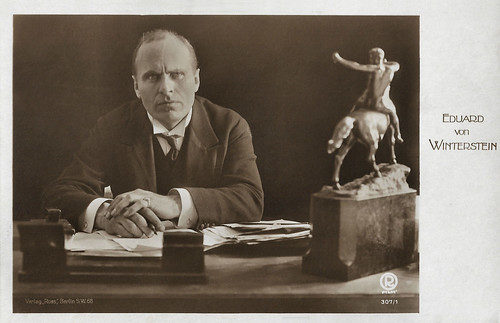
German postcard by Ross Verlag, no. 307/1, 1919-1924. Photo: Richard Oswald Film.
Berlin, the much-longed-for paradise
Eduard von Winterstein was born in 1871 in Vienna, Austria. Winterstein's parents were the landowner Hugo von Wangenheim and his second wife, the Hungarian-born actress Aloysia (Luise) Dub.
After taking acting lessons from his mother, Winterstein joined the stage in Gera in 1889, where, according to the memoirs of his youth published in 1942, he was able to experience an "undeservedly forgotten man", the actor Theodor Lobe.
At the opening of the theatre in Annaberg on 2 April 1893, he played the title role in Egmont there. "I was reborn in Annaberg, I had become a completely different person. I had only really become an actor in this small town. [...] Thus the Annaberg period became one of the most beautiful in my profession," he wrote in his autobiography.
At this theatre, he also met the actress Minna Mengers, whom he married in 1894 at the Wartburg (their son was the actor Gustav von Wangenheim, 1895-1975). The theatre in Annaberg-Buchholz today bears the name Eduard von Winterstein Theatre.
From 1895 Winterstein played at the Schillertheater, later at the Deutsches Theater in Berlin. On his move, he enthused about his adopted home with the following words: "Berlin! In those days, much more than today, it was the much-longed-for paradise to which every German actor aspired with all his might. [...] Here in this city of millions, a lively theatre life flourished.
The Theatre Almanac of 1895 lists twenty-four theatres in Berlin. [...] I had found temporary accommodation with my family in Großbeerenstraße. [...] I was happy that I was to make my debut in Berlin in this very role (as Tellheim in Minna von Barnhelm)."
From 1913 Winterstein also took on film roles, in which the stocky actor soon became the ideal cast of energetic respecters such as generals, judges, landowners, and directors. Unlike in the theatre, however, Winterstein's appearances in the film were usually limited to supporting parts.
Yet, already his second film, Schuldig (Hans Oberländer, Messter 1913) had him in the lead. From 1915, Winterstein performed in several films starring Henny Porten, mostly as evil antagonists, such as in the two-part Die Faust des Riesen (Rudolf Biebrach, 1917) and Die Claudi vom Geiserhof (Rudolf Biebrach, 1917).
In the late 1910s he acted in films by e.g. Rosa Porten (Die Erzkokette, 1917), Arthur Wellin (Erborgtes Glück, 1918; Pique Dame, 1918; Der Ring der drei Wünsche, 1918) all with Alexander Moissi, Richard Oswald (Der lebende Leichnam, 1918; Die Prostitution, 2. Teil - Die sich verkaufen, 1919), Robert Reinert (Opium, 1918-19), Jaap Speyer (Das Schicksal der Margarete Holberg, 1918), E.A. Dupont (Die Maske, 1919), and Rudolf Meinert (Das Kloster von Sendomir, 1919) with Ellen Richter.
He had the lead in In den Krallen des Vampyrs (Wolfgang Neff, Heinz Sarnow, 1919), the two-part Der gelbe Tod (Carl Wilhelm, 1919), Nerven (Robert Reinert, 1919), and Maria Magdalene (Reinhold Schünzel, 1919).
He also was the male antagonist in a few films with Hedda Vernon, directed by Hubert Moest (Blondes Gift, 1919; Die Hexe von Norderoog, 1919; Lady Godiva, 1920; Das Frauenhaus von Brescia, 1920; Das fränkische Lied, 1922). In Ernst Lubitsch' Madame Dubarry (1919) he played count Jean Dubarry, who concocts the plan to marry Louis V's mistress Jeanne (Pola Negri) to his brother.
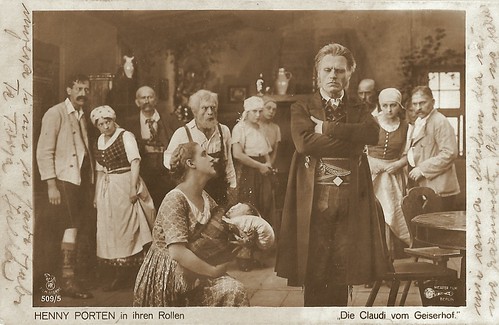
German postcard by Rotophot in the Film Sterne Series, no. 509/5. Photo: Messter Film, Berlin. Henny Porten and Eduard von Winterstein in Die Claudi vom Geiserhof/Claudi of the Geiserhof (Rudolf Biebrach, 1917). This mountain drama (Bergfilm) premiered at he Berlin cinema Mozartsaal, on 28 September 1917. Karl Freund did the cinematography.
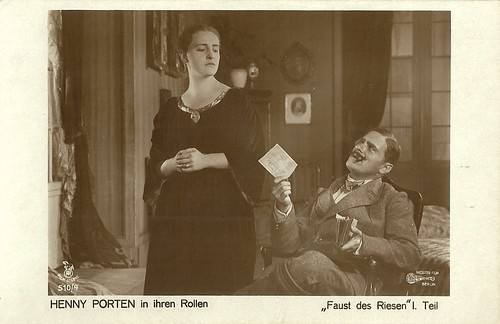
German postcard by Rotophot in the Film Sterne Series, no. 510/4. Photo: Messter Film, Berlin. Henny Porten and Eduard von Winterstein in the German two-part silent film drama Die Faust des Riesen (Rudolf Biebrach, 1917).
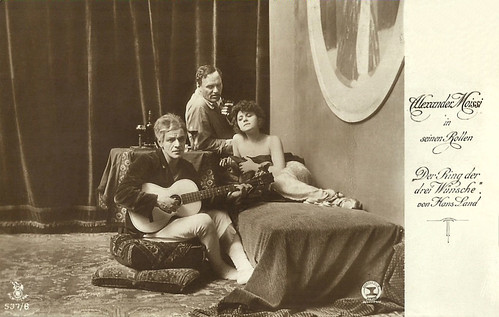
German postcard by Rotophot in the Film-Sterne Series, no. 537/8. Photo: Amboss-Film, Dworsky Co. Alexander Moissi, Ria Jende and Eduard von Winterstein in Der Ring der drei Wünsche (Arthur Wellin, 1918).
Extremely active in the early 1920s
Eduard von Winterstein remained extremely active in the early 1920s in such films as Der Reigen (Richard Oswald, 1919-20) with Asta Nielsen, Das Martyrium (Paul Ludwig Stein, 1920) with Pola Negri, and Die Tänzerin Marion (Fredric Féher, 1920). He appeared in Maria Tudor (Adolf Gärtner, 1920) with Ellen Richter and many more films with Richter and Gärtner would follow.
Von Winterstein had the lead in Das Haupt des Juarez (Johannes Guter, 1920). He played Claudius in Hamlet (Svend Gade, Heinz Schall, 1920-21) with Asta Nielsen as Hamlet, and he was general Westermann in Danton (Dimitri Buchowetzki, 1921) starring Emil Jannings as Danton. He also appeared in Die Beute der Erinnyen (Otto Rippert, 1921) with Werner Krauss.
In Friedrich Wilhelm Murnau's Der brennende Acker/Burning Soil (1921-1922) he is count Rudenburg who unknowingly hires golddigger Johannes as secretary.
From 1921 on, he also acted in the Fridericus Rex films (1922-1923), as Leopold Fürst von Anhalt-Dessau in the first and second part, Sturm und Drang and Vater und Sohn, on the youth of Frederick the Great, played by Otto Gebühr. In part 3 and 4, Schicksalswende and Sanssouci, he played Fürst Moritz von Anhalt-Dessau.
In addition to many supporting parts in the early 1920s, Winterstein had the male lead in Das Diadem der Zarin (Richard Löwenbein, 1922), Der Weg zu Gott (Franz Seitz Sr., 1923), Gott, Mensch und Teufel (Oskar Schubert-Stevens, 1923), In den Krallen der Schuld (Fred Rommer, 1924), Fräulein Josette - meine Frau (Gaston Ravel, 1926), Elternlos (Franz Hofer, 1927), Stolzenfels am Rhein. Napoleon in Moskau (Richard Löwenbein, 1927), Ein Tag der Rosen im August ... da hat die Garde fortgemußt (Max Mack, 1927).
When sound cinema set in, Eduard von Winterstein was the school director in Der blaue Engel (Josef von Sternberg, 1929-30) with Emil Jannings and Marlene Dietrich, while he had another supporting part opposite Jannings in Liebling der Götter (Hanns Schwarz, 1930). In Rosenmontag (Hans Steinhoff, 1930) he is the commander-in-chief of Mathias Wieman who has an adulterous affair with Lien Deyers.
In the early 1930s Winterstein played in several spy and secret service films, a.o. by Harry Piel, Gerhard Lamprecht a.o., while he continued to act in many period pieces.
After the Nazi takeover in 1933, he continued acting in films. As he now was of a certain age, he would often play the father of the male or female lead, e.g. Brigitte Horney's father in Der König des Montblanc (Arnold Fanck, 1933/34) or Ivan Petrovich's father in Die Korallenprinzessin (Victor Janson, 1937), or elder military, judges, commissionaires, priests, and aristocrats.
By the late 1930s, many parts by Winterstein were small and uncredited, but he had the male lead in the rural comedy Für die Katz (Hermann Pfeiffer, 1940), as a rich farmer who has a hate-love-affair with an innkeeper (Lina Carstens), which explodes when he shoots her cat who has killed his chicken.
In the anti-British war propaganda film Ohm Kruger (Hans Steinhoff, 1941), Winterstein played Cronje, one of the Boer army commanders opposite Jannings as Paul Krüger. Several minor parts followed during the war years. During the National Socialist era, he was placed on the "Gottbegnadeten" list at the end of the war by the Reich Ministry for Popular Enlightenment and Propaganda, so he wasn't sent to war.

German postcard by Ross Verlag, no. 627/4. Photo: Union Film. Pola Negri in Madame DuBarry (Ernst Lubitsch, 1919). By marrying the aristocrat Guillaume DuBarry (Karl Platen), Jeanne will be accepted at the Royal Court and become Louis XV's mistress. Back right on this card, DuBarry's brother Jean (Eduard von Winterstein) concocted the plan.

German postcard by W.J. Morlins, Berlin / Ross Verlag, no. 647/7. Photo: Karl Schenker / Cserépy-Film Co. Publicity still for Eduard von Winterstein as Leopold I, Prince of Anhalt-Dessau in Fridericus Rex (Arzén von Cserépy, 1921-1922). Caption: Fürst Leopold von Anhalt-Dessau, "Der alte Dessauer" (Leopold I, Prince of Anhalt-Dessau, "the old Dessauer").
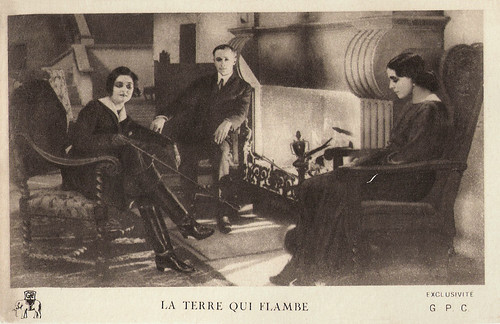
French postcard by Edition de la Cinématographie Française, Paris. Photo: G.P.C. Publicity still for Der brennende Acker/Burning Soil/La terre qui flambe (Friedrich Wilhelm Murnau, 1922). Count Rudenburg (Eduard von Winterstein), flanked by, left, his daughter Gerda (Lya de Putti), and right, his second wife Helga (Stella Arbenina).
Working for the DEFA
After the war Eduard von Winterstein was one of the people filmed for the 1946 newsreels Augenzeuge. From 1948 he worked for DEFA himself. initially in small parts, but from Die Jungen von Kranichsee (Arthur Pohl, 1950) he got substantial supporting parts.
He starred in Die Sonnenbrucks (George C. Klaren, 1950-1951) as an apolitical professor who keeps aside during the Third Reich, but is confronted with an escaped camp prisoner. His daughter helps the refugee but is killed herself. The professor, defamed by colleagues, meets the refugee at a conference in the GDR. The film won Von Winterstein the award for Best Actor at the Karlovy Vary film festival.
Another important part Winterstein had as a village priest in Das verurteilte Dorf (Martin Hellberg, 1951-1952), in which villagers protest against the removal of their town to make place for a US army base. Winterstein had the lead in Heimliche Ehen (Gustav von Wangenheim, 1955-1956), also with silent film comedian Paul Heidemann, and a young Armin Mueller-Stahl.
In Konrad Wolf's Genesung (1955/1956), Von Winterstein was a professor of medicine, confronted with a promising student of medicine (Wolfgang Kieling), who however has a dubious past. Von Winterstein's last (bit) part was in the Polish-German science-fiction film Der schweigende Stern (Kurt Maetzig, 1960). Eduard von Winterstein appeared in over 160 films.
Von Winterstein also scored various spoken-word records, including the ring parable from 'Nathan der Weise' for the GDR record label Eterna even in his old age. In the period after the Second World War, Winterstein belonged to the ensemble of the Deutsches Theater. There he played the role of Nathan almost four hundred times. Winterstein consciously chose to live in the GDR, a circumstance that the GDR's cultural policy took advantage of.
After his death, the Neue Deutschland devoted a special page to him, which included a text by Von Winterstein entitled 'Wahl des Besseren' (Choosing the Better). Its concluding passage reads: "I have experienced many transformations: under three emperors, the First World War, the pseudo-democracy of the Second Reich, the Weimar Republic, the terrible twelve years of National Socialism and the complete collapse of the German Reich brought about by it, until, breathing a sigh of relief, I joined the new progressive spirit of my own free decision and will, and now proudly call myself a citizen of the German Democratic Republic, and this out of insight, reasons, choice of the better."
During the 1950s Winterstein got several awards for his stage and screen work, including Best DDR actor. Winterstein is buried in the family grave at the Friedrichsfelde Central Cemetery. Since 1894, Winterstein was married to actress Minna Mengers. Their son was the actor and director Gustav von Wangenheim (1895-1975).
Eduard von Winterstein was on stage as an actor for a total of more than seventy years. His work is closely linked to the German theatre history of the 20th century and especially to the history of the Deutsches Theater in Berlin. He earned his greatest merits as a performer of roles from Lessing's plays. Winterstein stands for the concept of realistic theatre art advocated by Max Reinhardt and Otto Brahm.
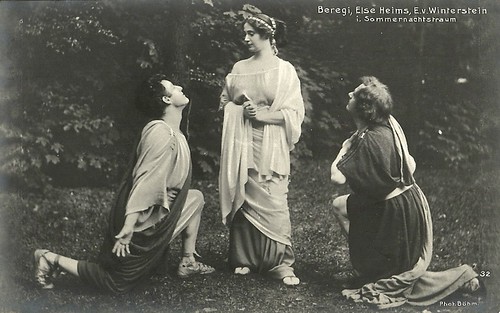
German postcard by Jos Paul Böhm, München, no. 32. Photo: Jos Paul Böhm, München. Eduard von Winterstein, Oscar Beregi, and Else Heims in the play 'Sommernachtstraum', Max Reinhardt's staging of William Shakespeare's 'Midsummer Night's Dream', first staged by Reinhardt in 1905.

German postcard by Verlag Hermann Leiser, Berlin-Wilm., no. 1957. Eduard von Winterstein as Faust in 'Faust' directed by Max Reinhardt (1913-1916).

German postcard. by Verlag Hermann Leiser, no. 7168. Photo: Zander and Labisch. Caption: Eduard von Winterstein as "Drayman Henschel". On the back is written that the play 'Fuhrmann Henschel' (Drayman Henschel) by Gerhart Hauptmann, a naturalist tragedy, was performed on 8 March 1916 at the Volksbühne theater in Berlin.
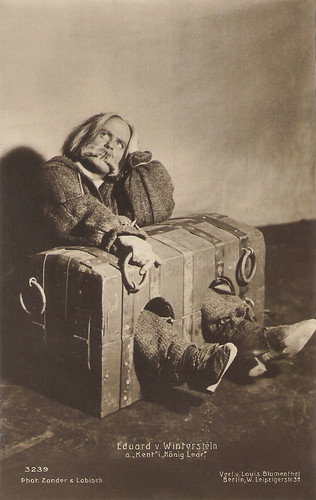
German postcard by Verlag Louis Blumenthal, Berlin, no. 3439. Photo: Zander & Labisch. Eduard von Winterstein as Kent in 'King Lear'.

German postcard by VEB Progress Film-Verleih, no. 214/56. Photo: DEFA / Meister. Eduard von Winterstein as Professor Beheim in Genesung/Recovery (Konrad Wolf, 1956).
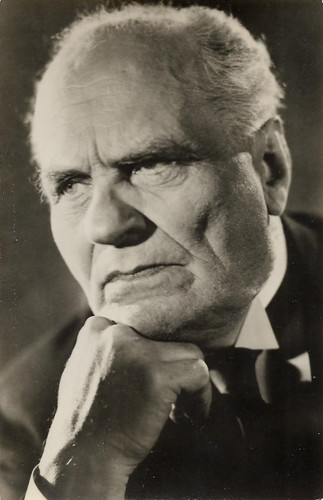
German postcard by VEB Progress Film-Verleih, no. 3107 15. Photo: DEFA / Wunsch. The card hints at Von Winterstein's DEFA films Die Sonnenbrucks, Das verurteilte Dorf, and Genesung.
Sources: Wikipedia (German and English), Filmportal.de, and IMDb.
No comments:
Post a Comment